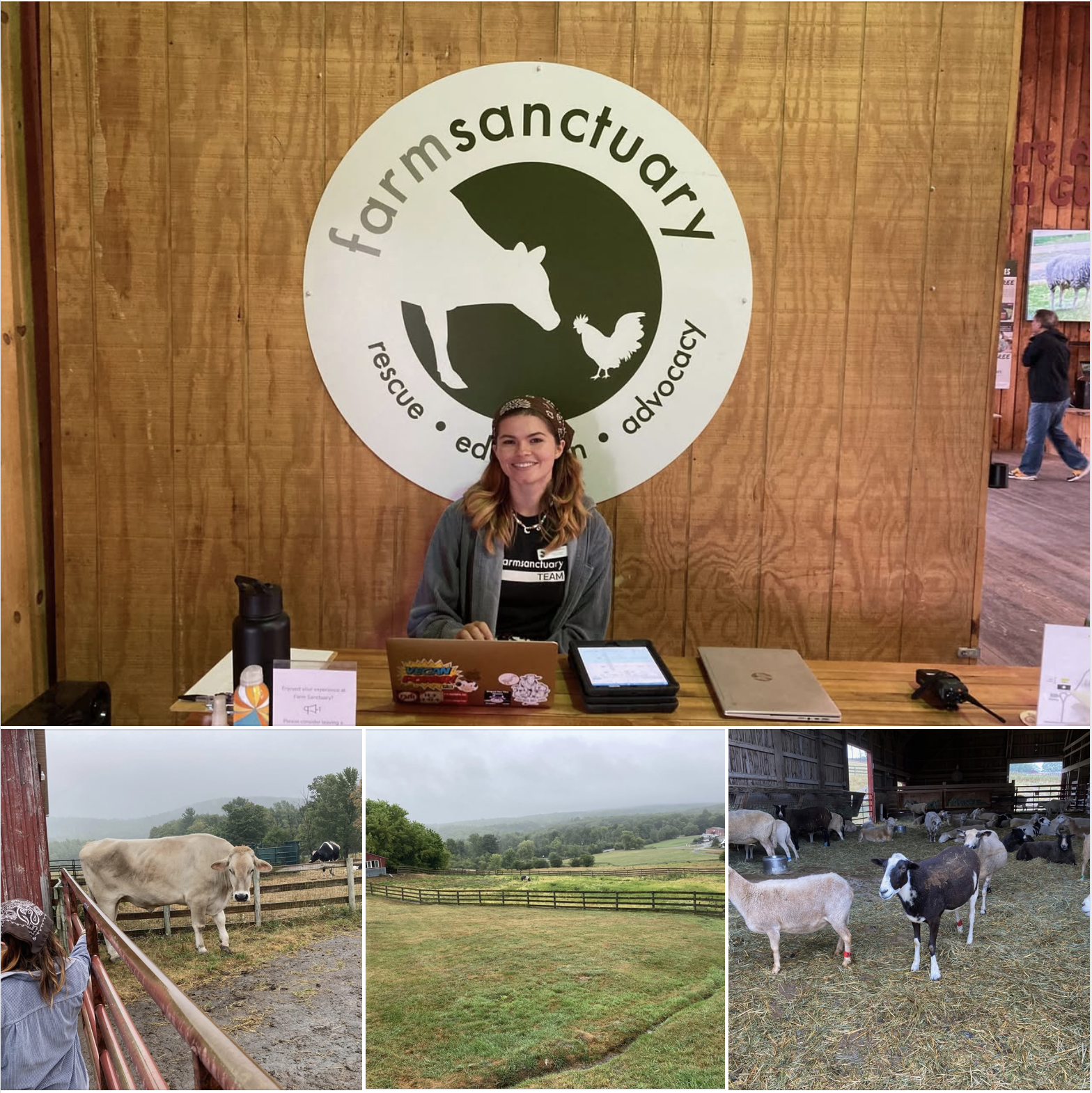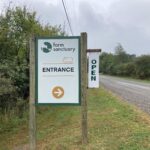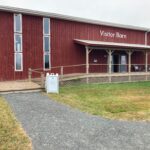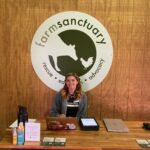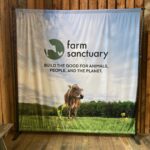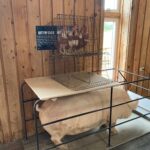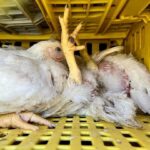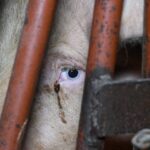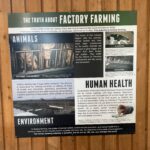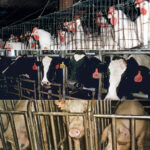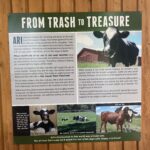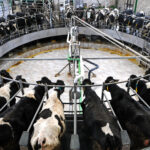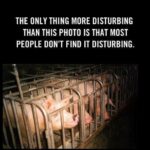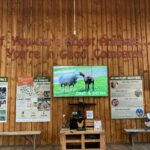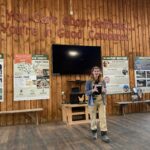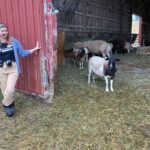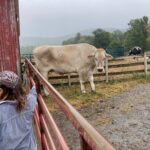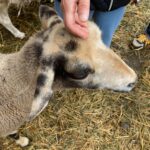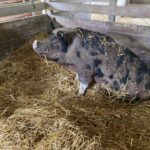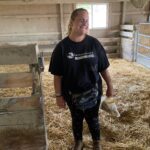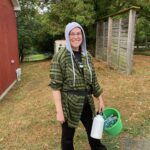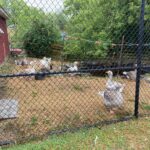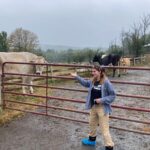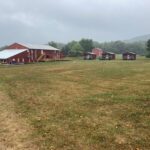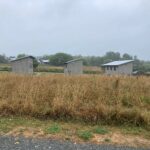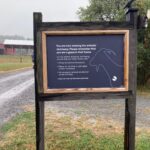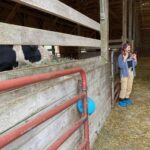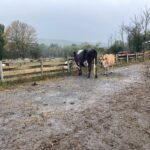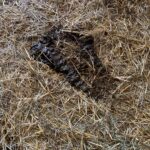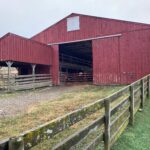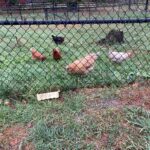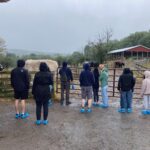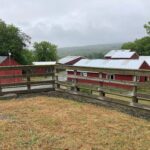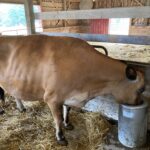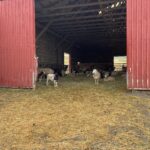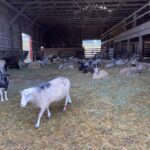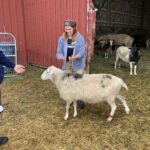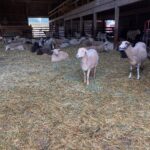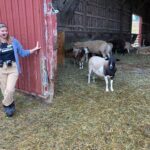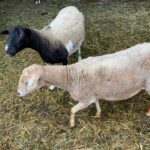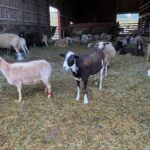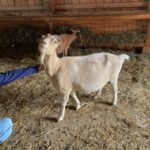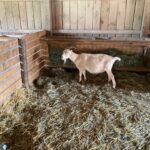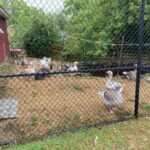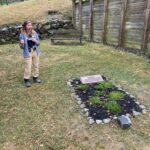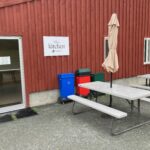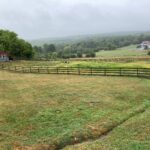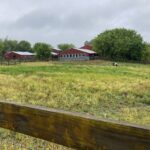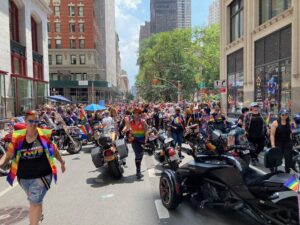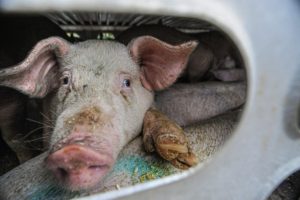In her book, Eating the Sun, Ella Frances Sanders writes that, “When one is considering the universe, it is important, sensible even, to try and find some balance between laughter and uncontrollable weeping.” Our planet is on fire, and as the US-Israeli Genocide in Gaza rages on, it is nearly impossible to find peace, let alone reasons to laugh. And for those of us privileged to know the truth, the news is grim across the board. Recently, I learned that the world now tortures, and slaughters, over 85 billion land animals per year for its unsustainable, and toxic “food” system, as compared to 75 billion only a few years ago. In addition, animal rights activist, Ed Winters, has explained, as more vegan restaurants close, how many plant-based restaurant owners are not only jumping ship, and serving meat, but even bashing veganism now too! Add to this the continued rise of US homelessness, food insecurity, suicide rates, military spending, and attacks on marginalized groups (as well as countless other injustices), and it’s as easy as ever to drown in despair.
Which brings us to Farm Sanctuary (FS). According to the FS website, “Farm Sanctuary was founded in 1986 to combat the abuses of factory farming, advocate for institutional reforms, and encourage a new awareness and understanding of farm animals and the benefits of plant-based living. In recent years, science has confirmed the inhumane and destructive impact of animal agriculture, a food system based on interrelated oppression and injustice. As the founding farm animal Sanctuary in the U.S., Farm Sanctuary has rescued and provided refuge for countless survivors of the animal agriculture system. Today, at Farm Sanctuary’s Los Angeles, CA and Watkins Glen, NY Sanctuaries you will find over 600 rescued animals, each with an individual story to tell. These survivors are ambassadors, representing the billions of farm animals currently in the system. They, and others like them, have changed the hearts and minds of a generation.”
Click here for the excellent 6 minute video on the history of Farm Sanctuary.
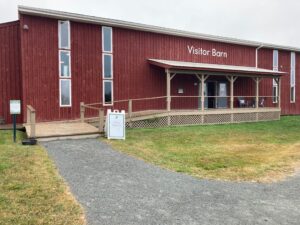
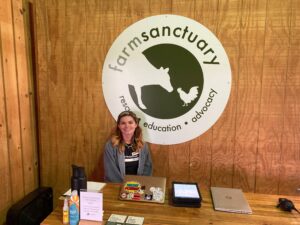
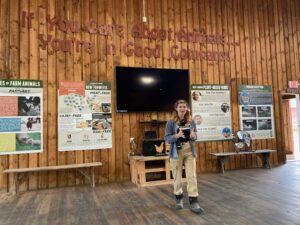
We arrived on a cold rainy day for August, but as soon as we entered Farm Sanctuary’s Visitors Barn, we were heartened by the warmth, and intelligence of our guide Alice, and her team. I have visited quite a few animal sanctuaries, and wildlife rescue centers over the years, and Alice is as good as it gets, especially with regards to her patience, humility, and easy-going sense of humor. I particularly admired how she met people where they were in their animal rights/plant-based journey. I try not to use the word vegan any longer, due to most people in the “vegan” movement being hypocritical, and silent or worse, on Israel’s US backed Genocide in Gaza. Rather than telling her guests to go vegan outright (ouch, I did it again!), Alice casually suggested meatless Mondays, as a more palatable path for those who were new to the concept of cruelty free, plant-based diets. Alice’s EQ was off the charts, especially considering how illiterate and misinformed most Americans are with regards to the food on their plates, and the actions of their government.
In fact, according to author, and activist, Will Potter (in his excellent book, Little Red Barns: Hiding the Truth, from Farm to Fable), “A survey by the U.S. Farmers and Ranchers Alliance, an industry group, found that 72 percent of Americans say they know very little about agriculture. In another poll by the W. K. Kellogg Foundation, researchers found that “Americans think very little about where their food comes from.” Researchers at Michigan State University found that 48 percent of Americans said they “never” or “rarely” seek information about how the food they eat was produced. Our children are being raised in true ignorance of food. In one study, published in the Journal of Environmental Psychology in 2021, researchers enlisted 176 children in the United States, between the ages of four and seven. The children were given stacks of laminated picture cards and asked where things like French fries and grass come from, and if they’re edible. The children failed at both tasks. The highest error rates were associated with animal-derived foods. About 40 percent of children failed to identify where hamburgers, hot dogs and chicken nuggets come from. About 41 percent of children said bacon comes from plants. If you think this is a problem confined to children who then “grow out of it,” consider a survey by the Innovation Center of U.S. Dairy. Researchers found that 7 percent of all American adults, that’s more than 16.4 million people, think chocolate milk comes from brown cows. Questions have been raised about the research methodology and its source, the National Dairy Council. But after reviewing the reports, surveys, and white papers produced over the past several decades on the topic, I am genuinely surprised the number was not higher.”
Click here to learn why children are unsuspecting meat eaters.
Click here to learn how to challenge the speciesist upbringing of children.
Scenes from Animal Factories, where 99% of Supermarket “Meat”, “Dairy”, and Eggs Originate
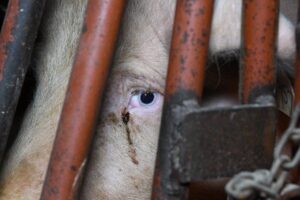
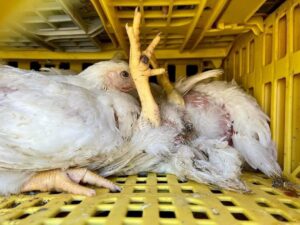
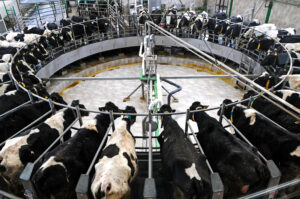
“One thing is clear: we are being raised in the dark about farming and food, both at home and in school. Multiple studies have shown that elementary school teachers lack basic knowledge of agricultural practices. (They also lack the adequate resources, time, and support required to create their own curricula on the topic and instead must rely on industry-created lesson plans.) In one study by researchers at the University of Oregon, for example, teachers were asked to describe what they thought a farm looked like. Some said their ideas of farming came from television shows like Little House on the Prairie. “When I think of a farm,” another teacher said, “I think of a big red barn.” – Will Potter (Little Red Barns: Hiding the Truth from Farm to Fable)
Click here for the University of Oregon study.
Click here for the film Dominion, to learn more about the horrors of animal factories.
Click here to learn in 5 minutes, why Dairy is SCARY.
The highlight of any trip to a sanctuary, is of course, the animals. Farm Sanctuary has over 400 amazing residents living at their NY shelter, and 120 at their California location.
Scenes from the Peaceful Farm Sanctuary Barnyard
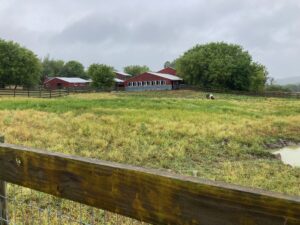
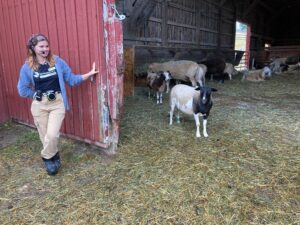
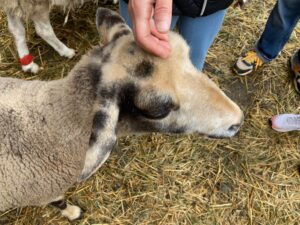
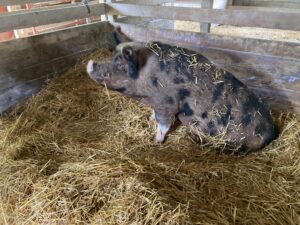
I asked Alice if she would be up for answering a few questions, and once again, she couldn’t have been more gracious. 🙂
Questions
1. What is one of your biggest challenges in managing, or working at an animal sanctuary? Funding, Money?
Alice: “FS is always in need of donations & volunteers! Personally, I work with the org’s visitor program, so our priority is getting the word out there about our visitor experiences. We host a tour program, volunteer program + events at both locations (NY & CA).
In NY, we operate a bed & breakfast + campsites as well as a fully vegan restaurant.”
2. Most children love animals. When do kids start becoming less compassionate? How do we get kids and adults to care more about animals?
Alice: “As children, we love animals but are quickly socialized to see farmed animals as “food animals” & cats/dogs as “pet animals”. This begins at home — many of us are told that certain animals will be on our dinner plate each night while we will take other animals for walks everyday. We are socialized to accept this speciesism early on. It pains me that not all adults will care about nonhuman animals no matter how much slaughterhouse footage they witness, but what they might care more about is their own health, the environment, social justice issues, or any other aspect of life negatively impacted by our food system…there are sadly so many to choose from. That being said, there are many great documentaries & books that explore these issues; I think consuming them is a great place for adults to start! Beyond that, kids & adults should visit farmed animal sanctuaries (virtually, sure, but ideally in-person)…which leads me to your next question!”
3. Why should people visit Farm Sanctuary?
Alice: “People should visit Farm Sanctuary because they’ll have the chance to connect deeply with inspiring rescued individuals. The peace that comes from staring into the soulful eyes of a senior cow is indescribable. We have two shelters the public can visit: one in CA & one in NY. At Farm Sanctuary, you’ll experience heartwarming animal encounters coupled with education about the systems they’re rescued from. Whether staying in our peaceful Bed & Breakfast, strolling to our Rainbow Bridge memorial, eating a delicious plant-based lunch in our Kitchen, or taking a tour to meet the animals, everyone will gain something meaningful from visiting.”
4. What do you love most about what you do?
Alice: “It is truly an honor to share our residents’ rescue stories with guests. Watching people make connections with nonhuman animals & seeing them as individuals (often for the first time) is incredibly rewarding. That being said, I love facilitating enrichment for the residents (scatter feeding, clicker training) & developing close relationships that I can demonstrate to others.”
5. When it comes to animal rights, how forgiving are you of people who are willfully ignorant?
Alice: “We all start somewhere, I personally was not always vegan, so I try to remember how easy it used to be to remain disconnected from realities of where my food came from (& who my food was). As long as someone is willing to have a conversation, I am willing to meet them where they are. Being as warm & welcoming as possible is necessary!”
6. What is the biggest lesson that you have learned so far in working at a sanctuary? What is the one piece of advice that you would give to others who would like to start an animal sanctuary?
Alice: “The biggest lesson I’ve learned working at a sanctuary is that rescue is one beautiful aspect of the animal liberation movement, but education & advocacy are also vital pieces to revolutionizing our food system. We cannot possibly rescue the trillions of animals killed for food each year, which is why it’s important we empower humans to go out & change the food system. I believe that anyone interested in starting their own sanctuary should first visit, volunteer & work at an established one to gain some insight into the complex operations. Farm Sanctuary’s volunteer roles or internships (remote/onsite) would be a great place to start!”
7. What role does love play in the work that you do?
Alice: “Without love, my work does not exist: love for farmed animals, love for all those humans & nonhumans exploited by animal agriculture, love for my fellow community, love for health, & love of the environment.”
8. I have become more cynical over the years with regards to having faith in our species to love all beings, and our only planet. What are your thoughts on the future of humanity and animals?
Alice: “This is an admittedly difficult question. What I can say is that I am granted sparks of hope daily by the open-minded individuals who come to sanctuary seeking a compassionate community. I am granted hope equally by those who leave here newly seeking that community. My colleague, Julia, often reminds me to fan even small embers of hope. It’s sometimes all we can do to keep going.”
9. What brought you to Watkins Glen, from Queens, NY? Do you have any regrets? 🙂
Alice: “I relocated to the Finger Lakes area from Queens, NY to work at Farm Sanctuary! I started as a seasonal tour guide & have since stayed on full-time. While I miss the abundance of open-late vegan restaurants in the city, there is a surprisingly robust vegan community right here. While the winters here can be isolating, I otherwise am incredibly grateful to live & work in this slice of heaven that is the Finger Lakes.”
10. What is one thing other than animals that you are most passionate about? Why?
Alice: “Besides veganism, I am most passionate about the kindness & enjoyment of life in all its forms: poetry, art, spiritualism, communication, mental health awareness, nature, food, Grateful Dead music, and so on.”
11. Have you lost or gained more friends by championing animal rights, and going plant-based (vegan)? What would you tell a young person who is afraid of losing the support of family and friends by going vegan, and speaking up for animal rights?
Alice: “I would tell a young person that doing the right thing is far more important than being popular, & it feels so much better to live in alignment with your morals. Veganism is ultimately about kindness & compassion, which everyone should be able to respect. If our friends & family were being treated like farmed animals in the food system, they would want us to advocate for them. As a teenager, my veganism put a strain on some of my relationships, but after years of conversations, many of those individuals are now mostly plant-based!”
12. How many animals do you have at Farm Sanctuary? Do you have a favorite, or two, or three?
Alice: “There are around 400 residents living at our NY shelter & 120 at our CA shelter. Bella cow (may she rest in peace) will always be a soulmate of mine, but I also love BFFs Bitsy & Jenny pigs, Ollie goat, Norman cow, Benjen rooster, & Scott sheep. I also love hearing my tour guests name their favorite individuals after getting to connect with them on tours!”
13. Are all of your animals rescues? Are their stories posted anywhere?
Alice: “The vast majority of our residents are food system rescues, minus the lucky few who were born here to rescued pregnant animals. Many of their inspiring stories can be found on our website (farmsanctuary.org) & social media pages (FS on Instagram, FaceBook, & YouTube). One of our favorites is the rescue story of that of Bonnie cow; check it out!”
14. Do you work with school children?
Alice: “We have an education department who works with school children; tons of virtual classroom resources are available on our website. Any youth aged 13-17 should consider joining our Youth Leadership Council. We also host educational tours for school groups & Girl Scout troops.”
Click here to learn more about Farm Sanctuary’s Youth Leadership Council.
15. Where does your love for animals come from?
Alice: “My love for animals is innate & was apparent in my childhood. As a teenager, I interned in a wildlife conservation organization, which strengthened my desire to work with animals in adulthood.”
16. What is one of your favorite stories that you like to tell about your experience at Farm Sanctuary?
Alice: “Storytelling is a powerful tool that we use in animal liberation activism. While statistics appeal to the logical mind, storytelling appeals to our emotions. Last year, I gave a tour to two sisters – self-proclaimed animal lovers, as many of us are. They made it known to me that they denounced factory farming but were in search of “ethical” sources of meat & cheese. As conversation carried us through our chilly sanctuary stroll, it became clear that one of the sisters was enduring a silent battle within herself – the same cognitive dissonance surrounding food that I knew all too well before my transition to veganism years ago. I noticed this led to her shutting down a bit while hearing emotional stories, so instead I chose to offer her some moments of silence once we got to the cow barn. Pietro was there snacking on some hay in his feeder while this woman extended her arm to stroke his chin as he munched. I chose in this instance not to delve into his rescue story – not to say anything at all, for that matter. Some quiet minutes passed as I watched her eyes swelling up with tears, which burst out when she finally exclaimed, “I felt him burp”! Streams of tears quickly escalated into heavy sobs as she repeated to me, & to her sister, that she’d felt him burp. She proceeded to say that Pietro clearly had a whole inner life like she did, from burping to side glances & eye contact, to friendship with Ted cow who was next to him, & so on… & whether he came from a factory farm or a small family farm, she didn’t want him to be rescued from her. Someone who’d come to the sanctuary that day actively looking for different ways to consume animals left with the realization that she could not eat them at all. It wasn’t stories alone that did this. It was the combination of open conversations, rescue stories, & silent moments spent stroking Pietro’s fuzzy chin.”
17. Where do you see yourself in 5-10 years?
Alice: “Where do I see myself in 5-10 years? I’d like to think I’ll feel I’ve made somewhat of a difference for farmed animals & all those suffering in our food system. I hope that by then, we will have seen even more positive progression in the animal liberation movement. I am sure I’ll still be working hard on behalf of those aforementioned individuals, whether in an educational setting or otherwise. Wherever I am, I hope I will be stronger, healthier, happier, & more full of love.”
What’s not to love? Thank you Alice for being so informative, kind & thoughtful. You give us hope. 🙂
Farm Sanctuary Team Members
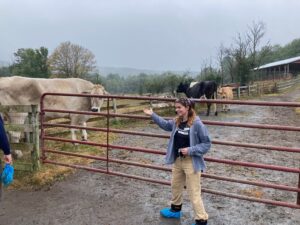 Alice
Alice
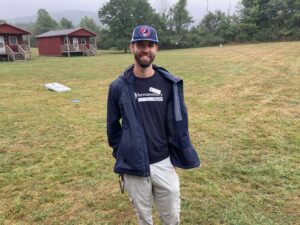 Scott
Scott
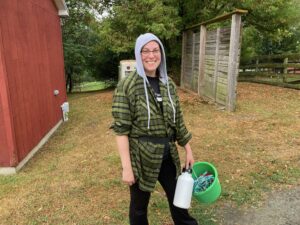 Aurora
Aurora
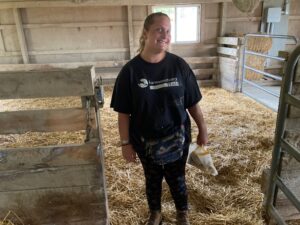 Emily
Emily
We loved our tour, and visit. Thank you again to all of the beautiful souls at Farm Sanctuary! 🙂
Until next time…
FREE PALESTINE!
 Artist: Carlos Latuff
Artist: Carlos Latuff
“Until we have the courage to recognize cruelty for what it is–whether its victim is human or animal–we cannot expect things to be much better in this world. We cannot have peace among men whose hearts delight in killing any living creature. By every act that glorifies or even tolerates such moronic delight in killing we set back the progress of humanity.” – Rachel Carson (1907-1964)
Additional Resources:
Click here to donate to Farm Sanctuary.
Click here to meet the animals at Farm Sanctuary.
Click here to learn more about Ella Frances Sanders from The Marginalian.
Click here to learn more about the power of laughter.
Click here to learn more about the beef industry’s plan to influence our children.

